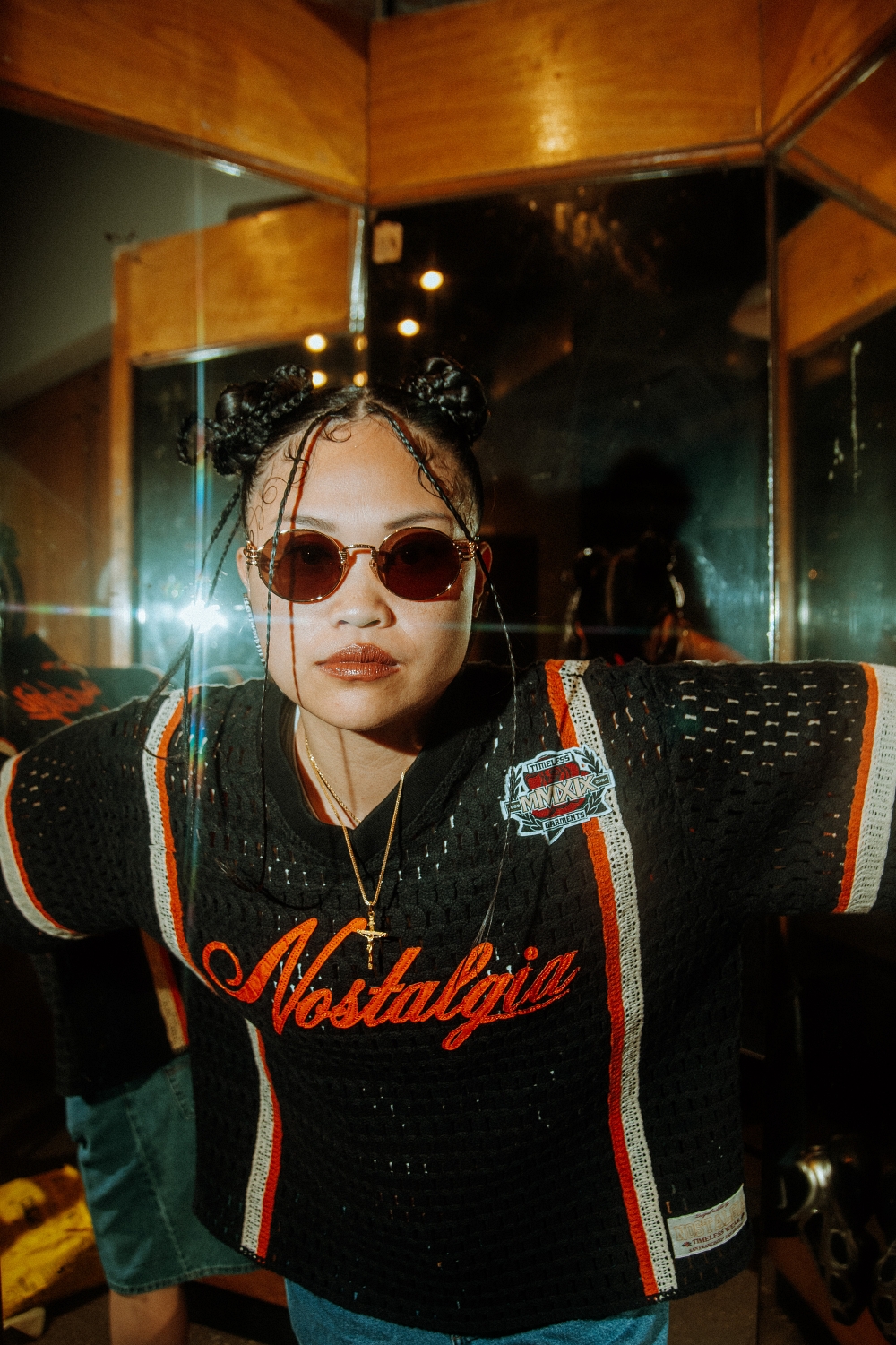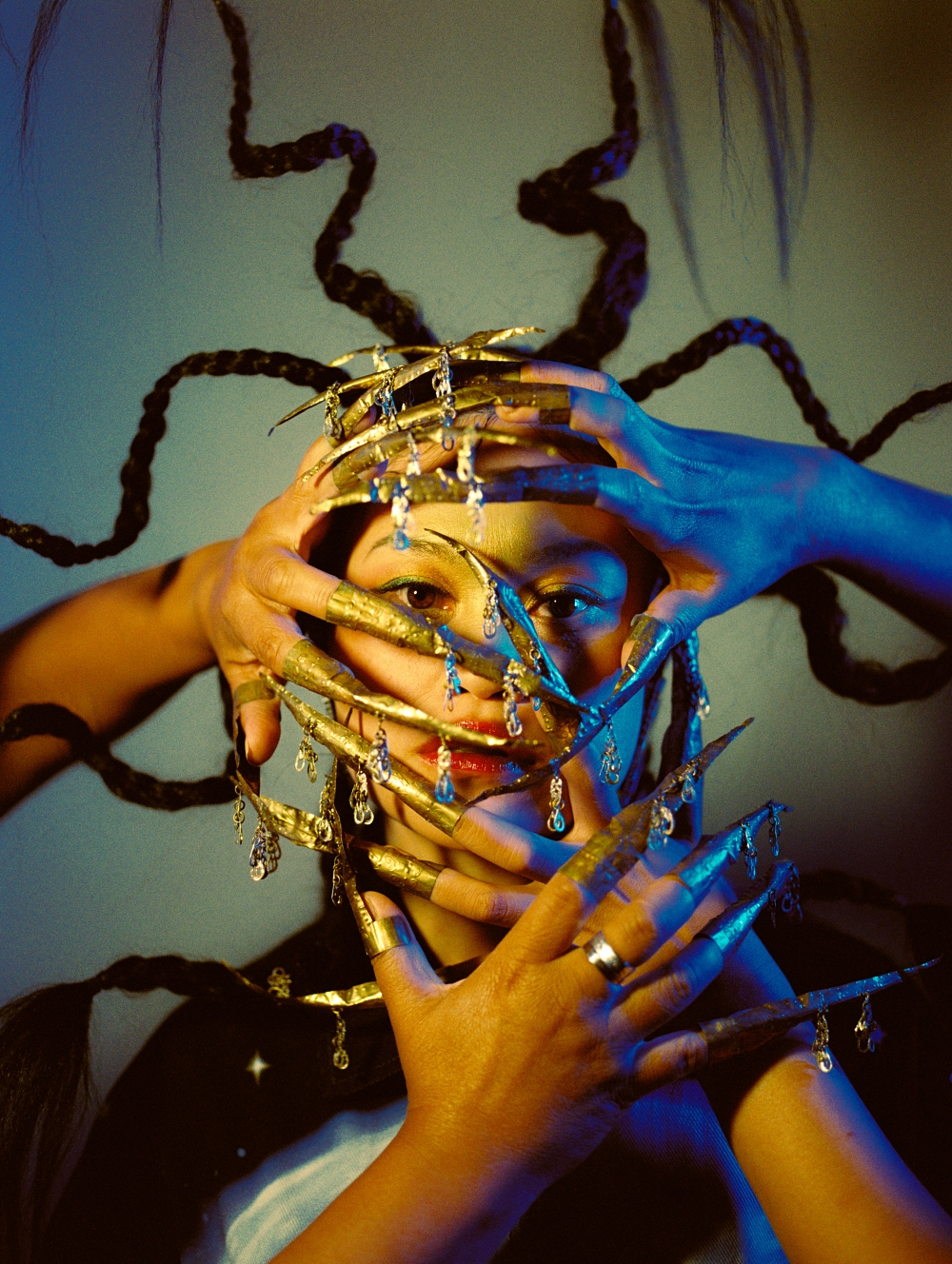Rapper Ruby Ibarra reignites Filipino hip-hop on the global stage
Sporting an “I Love Pinays” tee and a brushed-back ponytail in a room populated by a neat array of music and cultural paraphernalia, Filipino-American rapper Ruby Ibarra, alongside her all-Filipino band, including rock superstar June Millington, performed her Tiny Desk-winning track, Bakunawa, at the NPR headquarters in Washington, D.C. on May 29.
A tattoo on her left wrist depicting an eight-rayed sun and three stars, known features of the Philippine flag, was visible whenever she’d raised her hand into a fist, invoking her Filipino roots on the world stage.
Though not captured by the camera, the performance was witnessed by an intimate crowd of Ibarra’s family and friends. To the left of her was her mother, who couldn’t contain her emotions and was passing around a box of tissues, even as she’d heard the song hundreds of times prior. It was a moment six years in the making since the rapper’s first submission to the contest with the track Someday, which is part of her three-piece setlist for the NPR appearance, alongside 7000 Miles, a song grappling with her diasporic life.
Bakunawa, a multilingual track named after a moon-eating dragon from Filipino folklore, bested nearly 7,500 submissions from independent artists across the United States, a record-breaking figure in the annual competition’s 11-year history.
Now, Ibarra and her crew are on a national summer tour, hitting ten cities across the country, with other Tiny Desk alums and emerging musicians. Three days before we spoke over Zoom, Ibarra just concluded the West Coast and Midwest legs of the tour, and had been gearing up for their next stop on the East Coast.
On the road, the artist says it’s been incredible performing her music in front of new crowds and coming across different Filipino communities in the US. Having been raised in a tight-knit Filipino-American community in California, she didn’t realize that such space extends to the South, like in Nashville, the Tennessee capital where she recently performed. “It’s been amazing to see the different unique Filipino cultures in those areas,” she tells me. “Who would have thought (that) there’s Filipinos with Southern accents in that part of the country?”

Ibarra was born in Tacloban City before her family migrated to America in the 1990s, settling in San Francisco’s East Bay, where her mother took one odd job after another. Despite that whirlwind shift, music was a constant presence in Ibarra’s life. In her first few years in Tacloban, she was exposed to Original Pilipino Music through her uncles and cousins who were all part of bands. “I saw them firsthand, I saw them perform during fiestas,” she recalls. “And so that was already normalized around me. Music was always displayed and from an early age, it showed me too that it could be a possible route for me to express myself, but also as a possible career.”
Life in the Bay Area, which kept her in intimate access to Filipino culture, only heightened that artistic inclination. “Especially as a hip-hop artist, a lot of my musical influences come from the Bay Area, whether that be artists like E-40 or even Tupac from the West Coast,” Ibarra says. “They all played a large role (in) creating the musician that I am today.” Listen to her 2012 mixtape “Lost in Translation” or her 2017 debut album “Circa91” and you’ll trace that influence and the cultural divide she had to wrestle with, unafraid to speak about state violence, the immigrant experience, and the precarity of the American Dream. “I put my ‘face in a book’ ‘cause my people are ‘profiled’ / We erased from the books and my people are told lies,” she raps in “Circa91" highlight Here, just as she repeats, “I said, ‘Mama, we gon’ make it there someday’” in the single Someday.
Ibarra, who ditched her day job as a research scientist at a Bay Area biotech firm for a full-time music career in 2022, says she gravitated towards hip-hop because of the authenticity in the genre’s poetic core. “If you think about hip-hop as a genre really, at its core, it’s poetry over music,” says the artist. “And I think when it comes to poetry, there’s a sense of vulnerability there. There’s a sense of honesty and authenticity in the songwriting already. And I’ve always been a very reflective person.”
The rapper recalls how she loved to journal as a teen. “And so I think naturally, just because of the art form and the style of writing, a lot of my reflections became poetry, which then became hip-hop,” she says. She was 13 when she began rapping and recording her own music, and later joined SickSpits, a spoken-word collective, upon attending the University of California, Davis.
Bakunawa, the lead single in her forthcoming sophomore album, continues Ibarra’s poetry and slick rhymes, motored by an incisive blend of English, Tagalog, and Bisaya. The track reframes the mythical creature as a feminine force, like “Gabriela, Nieves, and Maria combined into one,” to claw back a sense of history long eclipsed by institutional violence. The track thrives in the genre’s textured rhythms and, more refreshingly, refuses to exoticize the rapper’s diasporic roots. In no way does it feel self-pitying, but simply a sonically propulsive piece.
I pressed Ibarra about the diaspora that her craft carries. “Having those cultural differences, I think I’ve always been, in the back of my head, cognizant of that,” says the 37-year-old artist. “If I were to present Filipino culture in my art, it has to come from an intentional place, but also from a respectful place, that I need to do my due diligence in doing the research and making sure that if I wanna talk about the Bakunawa or display it in my music video, for example, there needs to be an educational aspect to it too. Like I need to actually know what I’m talking about. As a Filipino-American artist, that to me is very important in terms of celebrating my identity.”
I want to show people that Filipino music isn’t one thing.
Collaborating with June Millington, of the legendary all-female rock band Fanny, who chiefly saw success in the early 1970s, for the Bakunawa music video, released in September 2024, is proof of that commitment. Fanny, led by June and her sister Jean, was a pioneer in the Filipino-American music scene, but their legacy was somehow obscured from broader cultural conversations.
“I always want to give June Millington her flowers whenever possible,” says Ibarra. “To think that June and her sister, both Filipino-Americans in the 1960s and ‘70s, had their own all-female band and were also able to chart on the Billboard at that time. Think now in 2025, how much of a challenge that still is, and the fact that they did that decades ago is so inspiring and so powerful to see. And again, I just hope that more people are able to not only discover them, but maybe also rediscover Fanny’s music and the history that they made.”
Ibarra says that even now at 77 years old, Millington remains an incredible performer and hasn’t missed a date on tour. “She rocks it out every single night,” she continues. “I think oftentimes what the music industry tries to tell women who are creatives is that we have an expiration date, that we can only create music or present ourselves until a certain age, and June is completely defying that.”
Beyond this, Ibarra stays committed to working with emerging voices like Ouida and Han Han, both Filipino immigrants. The rapper’s NPR ensemble, apart from Millington and Ouida on vocals, also featured Anna Macan on vocals and electric guitar, Camille Ramirez on bass and flute, Angelo “LASI” Macaraeg on keys and acoustic guitar, JoJo Ramirez on drums, and Charito Soriano on background vocals.
In 2023, Ibarra and LASI co-founded Bolo Music Group, a record label focused on platforming Filipino-American talents. “For us, it’s been years-long worth of conversation of why something like this needs to exist, why more of this needs to exist,” reflects Ibarra. “And we have finally come to the conclusion that there’s so many amazing and talented Filipino artists, especially here in the U.S., but there’s not enough resources. Oftentimes, especially as independent artists, we find ourselves having to build our careers from the ground up, and mentorship is very scarce and hard to build.”
The label currently has three EP releases in its pipeline from artists Ian Santillano, Ouida, and Vince A. “I want to show people that Filipino music isn’t one thing,” Ibarra adds. “It’s not just pop, it’s not just R&B, it could be all of these things. And what makes me excited about Bolo is that together, we’re helping kind of redefine what Filipino-American music can be and can sound like.”
Ibarra’s next album will also be released under Bolo, and people can expect a more sonically and lyrically mature work. “I think the Bakunawa performance is a strong indication of what the rest of the album is gonna sound like,” she says. Live instrumentation will be the album’s steady ammo, featuring traditional Filipino instruments like the sarunay and kulintang, and Ibarra’s usual hip-hop sounds will be layered with jazz and rock music.

Between working on the second album, performing on the road, and fulfilling her duties as Bolo’s CEO, Ibarra’s life has taken another turn after giving birth to her first child last year. Asked about how she decompresses, the artist humors me, “What’s rest?” But it’s not lost on her that behind her labor, artistic or otherwise, is a strong support system. “When you have a community that you can work with, but also trust and rely on, that makes things a lot easier to be able to do a multitude of things,” she says.
In 2013, Ibarra performed at the Araneta Coliseum alongside Pinoy hip-hop figures, the likes of Mike Swift, Loonie, and Abra. Six years later, she returned to Manila and performed on the Wish Bus and at Rappler’s headquarters. The musician has not skipped a beat since, taking gigs left and right, all the while shaping her sound and identity. “If one door doesn’t open right away, I know that if I keep my path forward, there’s going to be other doors that will eventually open,” she says. Now, Ibarra finally gets her due, claiming her spot on the global stage. Naa na ang bakunawa.


